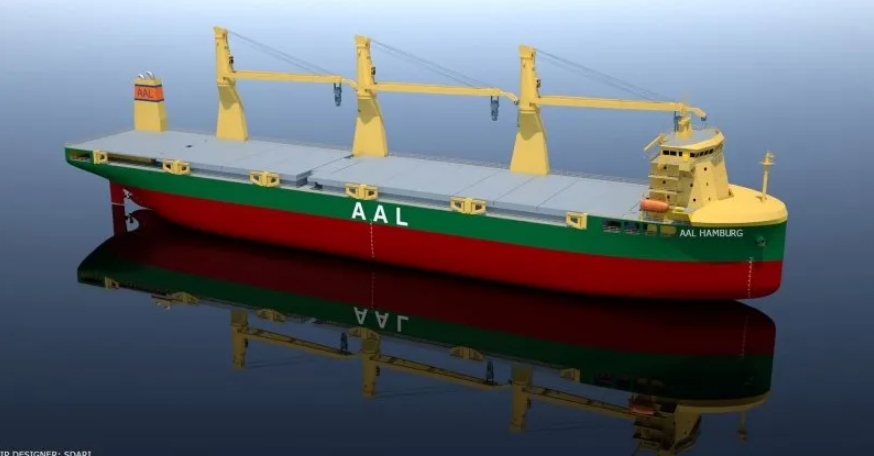Late November 2021, AAL Shipping (AAL) announced the launch of its third-generation newbuilding plan with the initial order of four 32,000 deadweight (DWT) premium project multipurpose vessels and classifying them the ‘Super B-Class’.

The design of these vessels was a collaboration between AAL’s engineering and commercial teams working alongside sister company, Columbia Shipmanagement (CSM) – responsible for over 270 newbuilding projects in top yards around the world. The carrier, which already operates a fleet of 25 heavy lift multipurpose vessels (MPVs) on busy trades globally, has now increased its order of the Super B-Class to SIX vessels and released first images, technical and design details of how these revolutionary premium project carriers will live up to their ‘super’ name.
Nicola Pacifico, Global Head of AAL’s Transport Engineering Department, explained, ‘These vessels were designed to be the most efficient and competent MPVs in the water. They will perfectly complement AAL’s fleet and service profile and, in their design, we harnessed all of our engineering team’s expertise in handling heavy lift, breakbulk and dry bulk cargo since 1995. The Super B-Class will have the capability to accommodate safely more than 60,000 freight tonnes (FRT) of cargo on a single sailing and literally any cargo big and small. The already significant clear weather deck space of 146 x 26 metres will feature unique extendable pontoons that can increase stowage space even further, as well as allowing certain cargoes to safely overhang the deck when required, like wind blades.
With the bridge and accommodation block positioned forward, our crews will have unobscured sailing visibility and no physical restriction on cargo height. Moreover, the vessels can also sail with open hatch covers, enabling extremely tall and over-dimensional units to be stowed safely in hold space. And, despite significant cargo intake volume and size (vessels will be just shy of 180m in length), the hull design of the Super B-Class will deliver a 6.5 metre minimum draft, allowing AAL to call far smaller and more remote ports, which is perfect for employment on dedicated large projects.’
Yahaya Sanusi, Deputy Head of AAL’s Transport Engineering Department and the naval architect responsible for many of the ideas incorporated into the vessels’ innovative design added, ‘Three heavy lift cranes positioned along the vessels’ port side will feature 350t lift each and combinable up to 700t max. Tandem lifting can be done in combination with both crane number 1 and 2, and crane number 2 and 3. This enables cargo loading at both the fore and aft of the vessel – optimising deck space and capacity and mitigating the need to lift large project cargo into just one area and move it by other means into final stowage position which is time and labour intensive. The cranes are also designed with a wider outreach of 35.7 metres at higher lifting capacity and render far more flexibility and options when loading large and / or heavy units.’
Under deck there will be two box-shaped cargo holds, one a staggering 68 x 25 metres, and the other 38 x 25 metres and with a height of 15.6 metres. They also feature adjustable pontoon triple deck capabilities as required, to optimise cargo intake. With no centre line bulkhead, the holds are designed to perfectly accommodate dry bulk commodities and optimised for stowage of dangerous IMO cargoes.
The Super B-Class will be dual fuel and methanol ready and run-on MAN main engines of 7,380 kW – supported by 2 x 1,700 kW and 1 x 1,065 kW auxiliary diesel generators. The vessels will be NOx Tier III compatible with HPSCR, EEDI phase 3 compliancy, featuring a projected service speed of 14.5 knots. They will also feature modern ballast water treatment systems and innovative hull coating that delivers greater fuel efficiency and reduced CO2 emissions. Overall, the Super B-Class will meet the highest possible automation and emission standards, as well as complying with IMO regulations on emissions and sustainability for environmental protection.
Five of the Super B-Class will be named after major breakbulk ports: AAL Antwerp, AAL Hamburg, AAL Houston, AAL Dubai and AAL Dammam. The sixth vessel will proudly bear the name AAL Limassol, in tribute to the town where AAL’s story first began in 1995.
Source: AAL